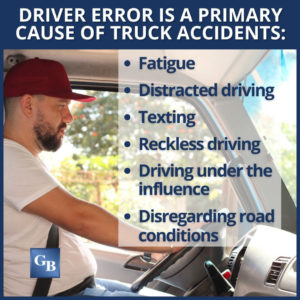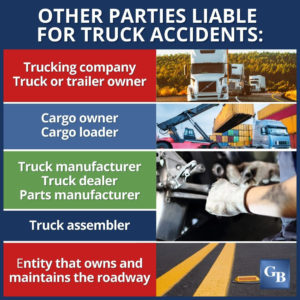 What Causes Truck Accidents?
What Causes Truck Accidents?
Many factors and conditions contribute to truck accidents. A knowledgeable truck accident lawyer can investigate the cause of your accident and help you navigate the legal claims process.
Most truck accidents are preventable, and the causes of these collisions fall under three main categories: driver errors, trucking company errors, and manufacturing errors.
What Are Driver Errors?
Driver errors are the most common reasons for accidents involving semi-trucks and tractor-trailers and include the following.
Fatigue
When a driver sets out on a long haul, they must adhere to federal regulations for breaks if they transport goods from state to state. These regulations include:
- Each duty period must begin with at least 10 hours off-duty.
- Drivers may work no more than 60 hours on-duty over seven consecutive days or 70 hours over eight days. They must maintain a driver’s log.
- Drivers can be on duty for up to 14 hours following 10 hours off duty, but they are limited to 11 hours of actual driving time.
- Drivers must take a mandatory 30-minute break by their eighth hour of duty.
- Drivers who work only within one state are subject to that state’s guidelines for rests and breaks.
Some truck drivers may disregard the regulations for breaks. They may try to make up for lost time because of adverse weather or traffic jams, or maybe they are trying to make an unrealistic deadline set by their employer. Whatever the reason, a truck driver who does not follow these regulations can become seriously fatigued or fall asleep while behind the wheel, leading to a serious accident.
Distracted Driving
Distracted driving is a leading cause of big-rig accidents. The primary culprit is using a cellphone while driving, including answering calls, making calls, texting, answering, or reading emails, watching videos, and other phone activities.
Using a dispatching device while driving is akin to texting for truck drivers. These devices help drivers communicate, navigate, and keep logs. They are sometimes called mobile or portable data terminals, and they can be distracting to a driver. That is why many trucking companies have policies against engaging with the device while driving. Some devices even automatically lock when the truck is in motion.
Generally, anything that takes a driver’s eyes off the road, hands off the wheel, or mind off driving is a distraction, such as:
- Watching videos.
- Eating and drinking.
- Loud or constant chatter on the in-cab radio.
- High volume on the radio.
- Glancing down at a GPS system or dispatching device.
- Looking at roadside attractions.
- Talking with a passenger.
Impaired Driving
Some truck drivers will take stimulants or other drugs to keep awake. Others may drink alcohol while behind the wheel. Even an over the counter or prescription drug can affect a driver’s ability to focus and operate the vehicle. Just like passenger car drivers, truckers should never drive under the influence of an intoxicating substance.
Improper Training or Licensing
Although this can also be the company’s fault that hired them, a truck driver who is not licensed and trained to drive a large commercial truck is a liability. Driving trucks that can weigh up to 80,000 pounds takes skill and experience, as well as a commercial driver’s license (CDL). Truckers who get behind the wheel without training and licensing are putting their and others’ lives at risk.
Reckless Driving
Many times, truck drivers are working under tight schedules and with inadequate breaks. Sometimes, they are distracted. This can lead to reckless driving, like:
- Speeding.
- Tailgating.
- Changing lanes abruptly.
- Aggressive driving.
- Not leaving enough room to stop.
- Not taking extra caution with what is happening in their blind spot.
Disregarding Adverse Weather Conditions
Sometimes, heavy rain, snow, ice, or other weather events will cause roads to be slick or otherwise unsafe. A truck driver who does not slow down or use extra caution with dangerous weather and road conditions is a hazard to everyone.
Some truck drivers may think they are immune to weather and road conditions because they are in large, heavy vehicles, but that is wrong. They may be even more susceptible because commercial trucks are unwieldy by their very nature.
 Google Screened
Google Screened

 What Causes Truck Accidents?
What Causes Truck Accidents?